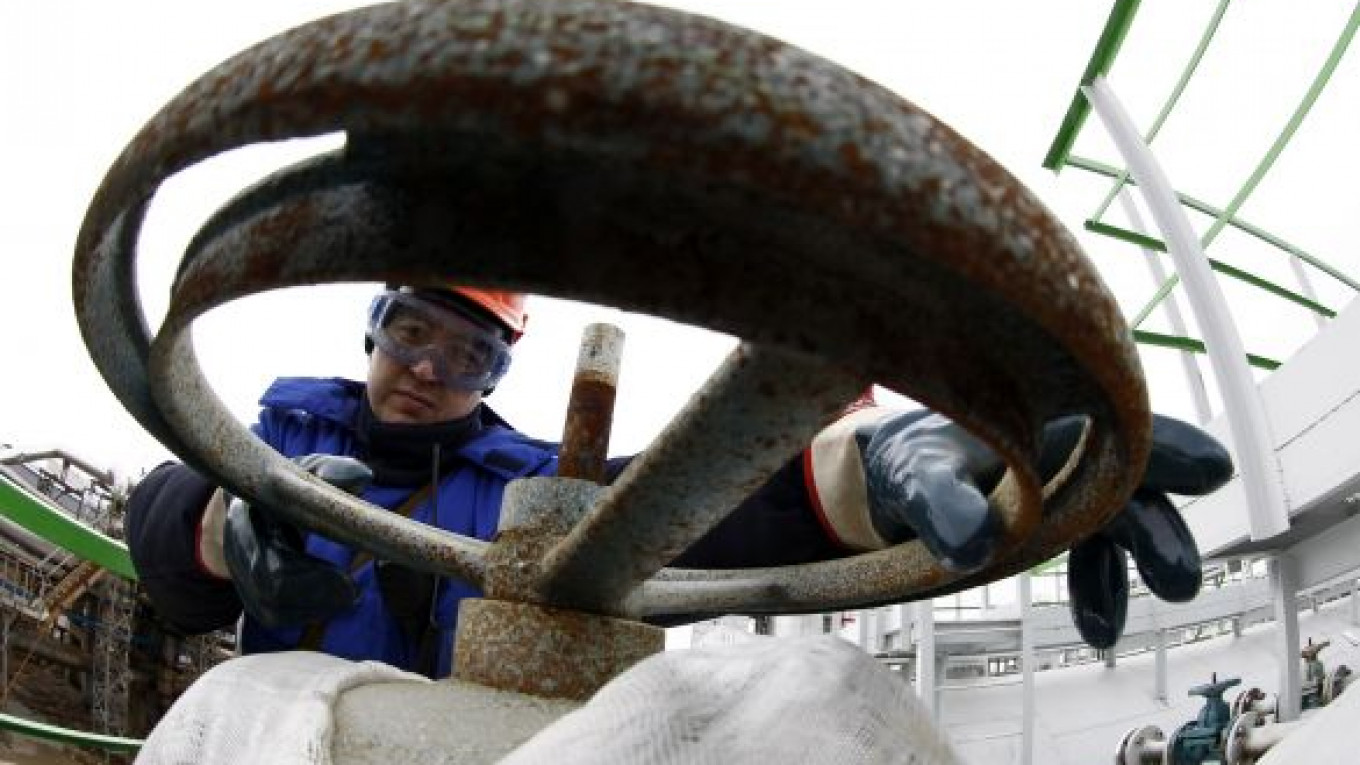Russia, making a strategic shift towards fast-growing Asian markets, said Thursday that it would ramp up eastbound oil exports next year, squeezing supplies to Europe as production is expected to plateau in the years ahead.
The Kremlin is staking a claim to the Asia-Pacific region while boosting the price it commands in Europe for its Urals Export Blend crude, which now often trades at a premium to North Sea benchmark Brent. As a result, European refiners are finding themselves pressed.
Deputy Energy Minister Kirill Molodtsov said Russia, the world's top oil producer, planned to increase oil exports via the Pacific port of Kozmino to 30 million tons (600,000 barrels per day) next year from the 21 million tons expected to be shipped this year.
"The balance between West and East will change," Molodtsov told reporters, without specifying the expected impact on exports to Europe.
European refineries are seeing their bills soar by billions of dollars a year due to the shift eastward.
From virtually zero five years ago, Russia's oil exports to China and the Pacific coast have risen to 750,000 barrels per day or 17 percent of its total, and they are set to double in the next five years.
As the International Energy Agency estimates growth in Chinese crude demand from just around 10 million bpd this year to 12 million bpd by 2020, the decision by Russia to make a dramatic eastward shift in crude exports has a clear rationale," the Eurasia think-tank said.
Seeing the Future
The move has proven to be a double win for Present Vladimir Putin, who back in 2005 asked his ministers to explain why Urals sold at a discount of $5-$6 per barrel to the European benchmark Brent.
At the time, most industry experts laughed at the remark, saying Putin should look for the answer in the quality of Urals, which is much inferior to Brent.
Fast forward eight years, and Urals barely ever trades at discounts of more than $2 to Brent and often spikes to a premium, including an all-time high of $0.90 per barrel reached this week.
Russia, the world's second-largest oil exporter after Saudi Arabia, is shipping around 3.5 million bpd to Europe. Any $1 per barrel upward move in Urals relative to dated Brent means an extra cost of $1.2 billion a year for European refiners. The difference in values versus 2005 could exceed $5 billion a year.
That is bad news for the sector, in which more than a dozen refineries have closed in the past decade, and more are expected to shut due to the dismal European economy and poor fuel demand.
Experts point to a myriad of factors behind the rise in relative values of Urals, most importantly the U.S. shale oil boom, which created a global glut of sweet Brent-like grades.
By contrast, previously cheap, heavier and sourer grades such as Urals have become scarce. Iranian exports of such crudes have been curtailed by sanctions and Iraqi exports disrupted by pipeline outages.
But a major reason that Urals has become expensive is Russia's shift in flows towards Asia, which U.S.-based think-tank ESAI Energy described as "the 21st century equivalent of Peter the Great's founding of Saint Petersburg as Russia's window on Europe."
An ESAI report said, "(The) Putin regime is tacitly turning away from 'energy superpower' aspirations in favor of securing stable markets for its energy resources. A Russian shift from West to East and the forging of a stronger China-Russia axis are two of the consequences."
Irreversible Trend
Russian flows to Asia are coming not only from East Siberian oil fields but also from Vankor and other swing sources that could flow either to Europe or Asia.
"Given oil demand trends in the European market, Russia could be making a turn to the East that is irreversible," ESAI said. "It seems President Putin has finally learned something about securing access to markets."
Eurasia also said the industry had questions about whether East Siberia could ramp up output quickly enough to supply Asia, meaning that more volumes could be diverted away from Europe.
Igor Sechin, the boss of state-controlled oil company Rosneft and one of Putin's closest allies, may have been the man who explained to the Kremlin all the advantages of changing oil flows.
"When Sechin was explaining his plan to re-route oil flows to China, he said it would lead to a strengthening of Urals in Europe," a Russian industry source said.
A Rosneft representative said stronger Urals was beneficial for Rosneft but did not comment on Sechin's views.
Analysts also say rising domestic refining means Urals will be even more vulnerable to spikes to new record premiums, especially in summer driving season when more fuel is needed to meet demand from a steadily growing number of cars.
"The summer months typically show high refinery utilization rates and coupled with rising exports to Asia means that we do not expect an uptick in shipments to Northwest Europe," said David Wech from JBC Energy.
A Message from The Moscow Times:
Dear readers,
We are facing unprecedented challenges. Russia's Prosecutor General's Office has designated The Moscow Times as an "undesirable" organization, criminalizing our work and putting our staff at risk of prosecution. This follows our earlier unjust labeling as a "foreign agent."
These actions are direct attempts to silence independent journalism in Russia. The authorities claim our work "discredits the decisions of the Russian leadership." We see things differently: we strive to provide accurate, unbiased reporting on Russia.
We, the journalists of The Moscow Times, refuse to be silenced. But to continue our work, we need your help.
Your support, no matter how small, makes a world of difference. If you can, please support us monthly starting from just $2. It's quick to set up, and every contribution makes a significant impact.
By supporting The Moscow Times, you're defending open, independent journalism in the face of repression. Thank you for standing with us.
Remind me later.






